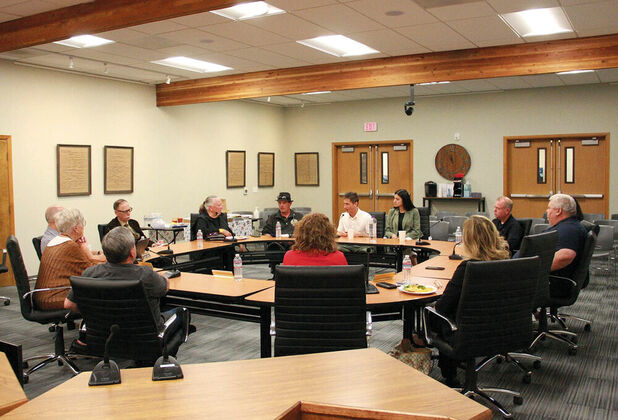By Benny Westcott
Of The New Era
Several local business owners came to the table Monday, June 20, to discuss with city councilors what can be done about vacant buildings downtown, among other things.
Peter Miner, who is considering putting in a brewery called 20 West at his 1101 Main St. property, said “We are interested in the city as far as its economic growth and its businesses. Obviously, when we open up, we want other businesses around us. Having vacant buildings right next to us is not attractive to people coming in. We’re kind of left alone out there.
“So we’re hoping that at some point vacant buildings get filled with businesses, which will help the city out and obviously us and the other businesses around us.”
Josh Victor, who owns several buildings downtown, spoke of some difficulties he faces. He said that it is challenging “finding tenants that have enough money to support their own business for at least a year or two.
“Undercapitalized businesses go in all the time, and then when you rent that building out and it goes empty for a month or two, that knocks your average down for a whole year. And now that building is no longer a positive building, but a loss. You want a stable enough business that’s going to be able to stay in there.”
He added that “Everyone wants to put in businesses, but nobody wants to spend the money.”
Striking a positive note, he said “You see the Taco Bell going in and a lot of stuff happening throughout town. I’m just wanting to see that momentum keep rolling. While we’re doing this and gathering momentum, it’s a lot easier to get those businesses to come down.”
Representatives from La Mota, including CEO Rosa Cazares, came down from Portland to attend the meeting. La Mota owns two storefronts in Sweet Home, as well as five currently vacant properties along Main Street.
Aaron Mitchell, who works in development and acquisitions for La Mota, proposed a “food cart alley,” or individual kitchens that are set up with an individual business in each kitchen and a common area in the middle where patrons of all the businesses dine. He said that 10 different “pods,” or businesses, may be able to fit in 1105, 1119, 1121, and 1111 Main Street. Then, at 1027 Main Street, he proposed residential “micro apartments,” which he described as “just 400 square foot apartments that are affordable, around $700 each.”
He talked about struggles to rent out La Mota’s downtown buildings.
“We went down to as low as $600 (monthly) on some of our places, and people didn’t even want to pay the $600 in one,” Mitchell said. “They wanted $350 or $400. And when that started happening it didn’t make a lot of sense to put more money into the buildings when we realized nobody wanted to rent them.”
Cazares put her support behind the food cart idea, saying, “We feel that this will give young entrepreneurs a chance with a very low cost to doing business. We want to give back. We want to be partners. We obviously believe in Sweet Home, as 3% of our sales tax goes directly to the city.”
When the pandemic happened, a lot of things stopped,” Cazares noted. “A lot of our construction projects stopped. So therefore, for this project, it’s just been timing. Primarily, our business and money is in the cannabis industry, so that’s always been our priority. But we do feel it’s time to come together with the city to say ‘OK, what do )we do with these properties?
“I’m ready and excited to come up with a big project that I could work with (city Community and Economic Development Director) Blair Larsen on achieving. Because I think we can do it very fast. We’ve been able to make a lot of connections in government, and I think our state is ready for some action.”
She added: “It’s going to be fun. We’re ambitious.”
Mitchell said a food cart location “offers a lot of variety. There’s something for everyone.”
Larsen touched on the importance of a diverse set of options being present in the area. “It’s got to be more than food. Because people aren’t going to go there just to eat. It helps to have that multifaceted thing. Either you have some residential above, or workplaces where people can go on their lunch break or whatever to eat.”
Attorney Peter Watts, whose office is based in West Linn and who said he attended the meeting in a volunteer capacity, said, “I think it could really work. And I think that there are probably a lot of entrepreneurs here that want that.”
He said that when the food cart model was used at a location in Portland “There were a lot of savings for those businesses. And then some of them, once they proved it in that location, they went to their own brick and mortar location.”
City Councilor Dave Trask told the property owners: “We want to do whatever we can do to help you get to where we want you to be.
“We want to make it as easy as possible for you folks to get stuff done. We’re not a rich city at all, but we will do what we can.”
Cazares advised the city against too much red tape.

“What we have to go through in permitting and issues really prolongs our projects,” Cazares said. “And depending on how busy we are in our company and what we’re doing, when the city hinders the growth and the remodels, it really kind of puts stops on projects. Because we as an organization have to decide where we invest our time.”
Larsen responded regarding the permitting process: “In the time that I’ve been here in the last three years, we are quite speedy. We are still government, so we have those things that we have to do, but compared to other municipalities, it’s a lot faster.”
City Councilor Susan Coleman said, “It has been a push for the council to make sure that this process is easier for property owners.”
Watts suggested that the community has a lot of potential.
“As I look at Sweet Home and Foster Lake and the natural resources you have, how you’re a gateway to the wilderness, it just seems like there’s some things that could really happen,” he said. “I think you’re on the front end of something that could be great, if the community wants it.”
He noted that “the vision and values of every community are different.”
Watts talked of a chain reaction that could bring growth to Sweet Home – and he said it starts on the gridiron, of all places.
“If Oregon State keeps winning football games and becoming more and more attractive to students, those students are going to need apartments,” Watts predicted. “Those apartments are going to push people that are working in Corvallis out. Albany can take some of that growth, but not a whole lot. Lebanon can take some of that growth – they already are doing that. You guys (Sweet Home) are going to take some of that growth too.”
He continued: “My analysis is that Corvallis’ urban growth boundary is too tight, and they don’t want development there. They’re creating barriers to development, which is why I think you’re seeing these three-story apartments in Lebanon with the surface parking.”
Watts noted “Looking at your downtown, there are a lot of opportunities. But there is a lot of blight. Let’s be realistic about what there is and what there isn’t.”
“How can you make it attractive for people to come and visit?” he asked. “Your natural beauty is just spectacular. Can you move some of your urban growth boundary to lakefront? Because people are looking for second homes. Detroit Lake burned and they’re already rebuilding everything there. There’s a serious shortage. You guys have this water. That could be a major tourism draw.”
Larsen responded, “There is privately held land that’s around the lake. The main problem is getting services to it and expanding your urban growth boundary.” But he noted, “For the development of properties, we’ve got all of the capacity we need. For anybody who wants to put in large amounts of residential properties, we can handle it.”
Watts said “The temptation would be to have development to your west because of Corvallis and Lebanon, but the natural beauty of the east could make it really compelling for people.”
He called for more help from the state.
“I just feel like Oregon needs to invest in Sweet Home,” Watts said. “Like a lot of traditional timber towns, a lot was taken away from this place. You’re telling these cities that are traditionally timber towns, find something else, and then you tell these cities that something else is tourism. Maybe that’s true. That has been the case for some communities in Clackamas County and certainly in central Oregon. But in order to make that jump, you guys need to have more money to brand and market yourself, and you need to have more money to invest in grant programs.”
Watts questioned whether Sweet Home could follow the model of Estacada, a city he has represented. “If people are going to spend the day on (Estacada’s Clackamas River), they want to have a microbrew, or that meal. Or maybe we don’t have hotels yet, but they’re going to buy gas. They’re going to do all of these other things to help and drive people to this community. So how do we do that?”
He said “It’s not how many times you get knocked down, it’s how many times you get up. And this is about Sweet Home getting up and giving people a reason to visit here, giving people a reason to get off of I-5, marketing that natural beauty and tranquility.”
In addition to speaking on Sweet Home’s potential merits, Watts touched on why it is difficult for property owners to rent right now.
“With all the governor’s emergency orders in place, if people don’t pay their rent, the landlords have no options,” he said. “It’s like a perfect storm of reasons not to rent right now. And that dynamic needs to be changed in order to get everything in play.”
Miner talked about other problems that are hindering his efforts to start a brewery at this time. “Inflation is killing us,” he said. “It’s the wrong time to be doing this, but we’re in it. The building’s just sitting there, so we’ve got to proceed. I think we have what we need to do it if we do it ourselves. We’ve already put a ton of money into it. We have enough money to do what we need, but not to have somebody do it for us. Contractors are expensive.”
Despite the issues at play for development in Sweet Home, Larsen noted that available property is not one of them “We have plenty of space, and plenty of buildings that could house viable businesses,” he said.
Sweet Home Commercial Exterior Improvement Program grant committee member Jo Ann McQueary, a longtime advocate of finding and establishing new options for Sweet Home, said, “We’re on Highway 20 that goes from Newport to Boston, Mass. There’s no shortage of traffic. We just need to be open and welcoming.”





